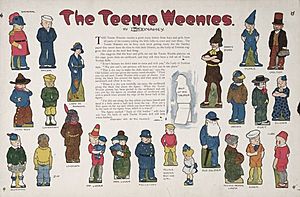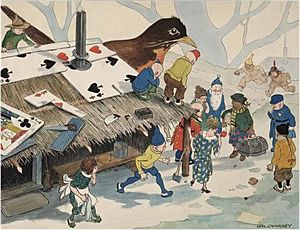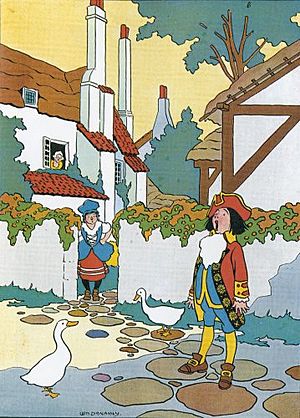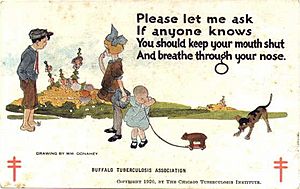William Donahey facts for kids
Quick facts for kids
William Donahey
|
|
|---|---|

ca. 1920
|
|
| Born | October 19, 1883 West Chester, Ohio |
| Died | 1 February 1970 (aged 86) Chicago |
| Occupation | cartoonist and illustrator |
| Nationality | American |
| Period | Twentieth century |
William Donahey (born October 19, 1883 – died February 1, 1970) was an American cartoonist. He is best known for creating The Teenie Weenies. This was a popular comic strip about tiny, two-inch-tall people. They lived together under a rose bush.
The comic strip appeared in the Chicago Tribune newspaper for more than 50 years. William Donahey drew about 2,100 Teenie Weenies comic strips in total.
When he was a child, Donahey was very shy. He would often imagine characters and stories, including The Teenie Weenies. Later, he turned these ideas into his job. His characters appeared in newspapers, books, and advertisements.
Contents
William Donahey's Life Story
Early Life and Art Training
William Donahey spent much of his childhood by himself. He was an introverted person, meaning he was quiet and enjoyed being alone. One of his favorite things to do was imagine strange, tiny creatures living in a small world. He later said this was how The Teenie Weenies began.
His parents, John and Catherine Donahey, saw how creative he was. They sent him to the Cleveland School of Art. They hoped he would become an illustrator, like his older brother James Harrison "Hal" Donahey. William graduated from art school in 1903. He worked briefly in advertising. Then, he joined the staff of Cleveland's The Plain Dealer newspaper. His brother Hal was already working there as a political cartoonist.
Family and Inspiration
While working at the Plain Dealer, William met his future wife, Mary Augusta Dickerson. She was from New York City. They got married on August 16, 1905. Mary was a writer for newspapers and wrote books for children. William started to focus on drawing cartoons for kids.
His wife introduced him to many classic children's stories he had not known growing up. These included Mother Goose rhymes, Alice in Wonderland, and Arabian Nights. Donahey really liked the Mother Goose rhymes. He began to illustrate them. Soon, he also started writing his own poems and stories.
Creating The Teenie Weenies
The editor of the Chicago Tribune newspaper, Joseph Medill Patterson, saw Donahey's artwork. He offered William a full-time job as a cartoonist for the newspaper's comics section. This is where Donahey created The Teenie Weenies. He was inspired by The Brownies, another popular comic by Palmer Cox.
The Teenie Weenies comics, written and drawn by Donahey, showed tiny characters next to normal-sized objects. This made the small characters seem even tinier. His stories often featured a large drawing and text. It told about the lives of many characters living under a rose bush. They used everyday objects like hats, jugs, and old boots. One story even involved an old, rusty tomato can.
The first Teenie Weenies comic appeared in black and white on June 14, 1912. In 1923, the comic moved to the regular Sunday comics section and started to be printed in color.
Spreading the Word
The Teenie Weenies comic strip became very popular. It was printed in newspapers around the world. The characters also appeared in books, school textbooks, and advertisements. Donahey allowed companies to use his characters on many products. These included decals, dolls, clothing, handkerchiefs, and tin boxes. He worked with companies like Monarch Foods and Reid-Murdoch.
Even though he had many licensing deals, Donahey spent most of his time and energy on drawing the newspaper comic strips. He was a member of groups like the American Press Humorists.
Personal Life and Family
William and Mary Donahey owned a unique house called the Pickle Barrel House in Grand Marais, Michigan. They spent their summers there. This house has been fixed up and is now a museum in Grand Marais.
William Donahey was good friends with Otto E. Newberg, who ran a lumber mill in Grand Marais. William also had an older brother named Victor Donahey. Victor was the governor of Ohio from 1922 to 1929.
William Donahey's Works
Books and Comics by Donahey
- The Pixeys - a comic strip from 1925.
- Teenie Weenies - comic strip that ran from 1914-1925, 1933–1934, and 1941-1970.
- The Teenie Weenie Primer, Adventures of the Teenie Weenies (1920)
- Down the river with the Teenie Weenies (1921)
- The Teenie Weenie Man's Mother Goose (1921)
- The Teenie Weenies Under the Rose-Bush (1922)
- The Teenie Weenies in the Wildwood (1923)
- Alice and the Teenie Weenies (1927)
Books Illustrated by Donahey
William Donahey also drew pictures for many other books, including:
- Huldy's Whistle by Anne Archbold Miller (1919).
- Lady Teddy Comes to Town by Mary Dickerson Donahey (1919).
- The Children's Mother Goose (1921).
- The Teenie Weenie Man's Mother Goose (1921).
- The Spanish McQuades: The Lost Treasure of Zavala by Mary Dickerson Donahey (1931).
- Hi, Ho, Pinocchio by Josef Marino (1940).
- Several Miss Minerva books by Emma Speed Sampson, such as:
- Billy and the Major (1918)
- Miss Minerva's Baby (1920)
- Miss Minerva Broadcasts Billy (1925)
 | Roy Wilkins |
 | John Lewis |
 | Linda Carol Brown |





